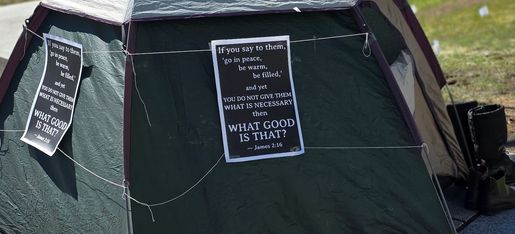Campaigns

Affordable Housing & Ending Chronic Homelessness
In 2023, VIA clergy and leaders, in conjunction with allies, succeeded in persuading the Governor and legislature to extend the state-run motel program at the end of the legislative session to continue to provide emergency shelter. Some 2,000 Vermonters were saved from eviction because of these efforts. Unfortunately another 800 people were evicted previously, and these folks, who are dispersed throughout the state, are in dire need of shelter with supports for mental health and substance use challenges.
Our LOC continues to meet as a statewide group, and we have created three subcommittees: 1) one for Burlington, to press the state to better coordinate with the city to handle the 250 unhoused people on the streets, 2) another for Central Vermont, to address the even greater demands on existing housing now that flooding has severely damaged 12% of that region’s units, and 3) a third in Bennington to establish a much needed and long-waited for day shelter.
The other important piece of our campaign is to ensure that every effort is made to shelter those who are unhoused. Many changes have been made to the emergency shelter program, including setting caps on the amount paid to hotels and standing up shelters urgently in several towns. VIA leaders continue to be frustrated by the lack of leadership of the Governor on this issue and the lack of alternatives for Vermonters, now that most of the federal money for emergency shelter has run out. Our VIA LOC has redoubled efforts to seek systemic changes that will protect those unhoused or precariously housed, including having numerous discussions with legislators and holding another press conference covered by VT Digger and by ABC 22/FOX 44.
The LOC and subcommittees meet approximately every two weeks, as the situation has been in constant flux.

Vermont Community Resilience
Building on our work with the Declaration of Inclusion, VIA leaders and clergy are following up on the pledge to welcome everyone regardless of race, religion, age, disability, gender expression, etc. This work holds space to stand up against hate & bigotry while also protecting and defending our constitutional rights like due process and freedom of speech.
.jpg/:/cr=t:30.27%25,l:18.25%25,w:35.99%25,h:48.08%25/rs=w:600,h:451.12781954887214,cg:true,m)
Faith Climate Declaration
The annual "Faith Climate Action Day" was held again at the Statehouse in Montpelier on Wednesday, February 28th. VIA co-sponsored the event with Vermont Interfaith Power and Light, VPIRG (Vermont Public Interest Research Group) and VNRC (Vermont Natural Resources Council).
More than 30 youth, clergy and leaders gathered for a time of training and poster making before heading to the statehouse for a press conference on climate action issues that the groups are concerned with. The three pieces of legislation that our groups strongly support are the Climate Superfund Act, which would require money from fossil fuel companies to help address climate change; Renewable Energy Standards 2024, which would update the standards first set in 2015; and a Rate Payer Protection bill, which would help lower-income households make the transition to renewable energy without experiencing higher costs.
After the press conference, leaders meet with House and Senate leadership as well as the Lt. Governor. The day concluded with individuals meeting with their elected officials. VIA will continue to explore issues on Climate Action both at the state and local levels.

Extreme Cold Weather Shelter Locations
For more information, contact ecwsp@viavt.org. Activation dates will be shared with 211.
ECWSP site locations:
- Bennington County – Bennington County Coalition for the Homeless at St. Peter's Episcopal Church
- Chittenden County – Champlain Valley Office of Economic Opportunity at the Miller Center
- Northeast Kingdom – Northeast Kingdom Community Action at 371 Main St. Newport
- Rutland County – City of Rutland at the City Library
- Washington County – Montpelier Emergency Cold Weather Shelter, at the Teen Center (City Hall)
- Windham County – Brattleboro Emergency Winter Shelter at 1st Methodist Church